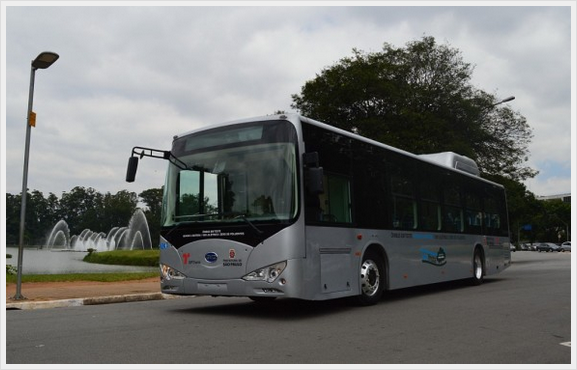
Photo: C40-1
São Paulo to introduce its first fleet of fully electric buses
15 January 2014
by Richard Forster
São Paulo is preparing to roll out its first fleet of fully electric buses in an effort to reduce the city’s greenhouse gas (GHG) emissions and improve the quality of the transport system. The city has already begun phasing out fossil fuel-powered buses as part of its goal to have the entire municipal bus fleet run on renewable fuels by 2018.
In an effort to introduce non-polluting transport solutions for Paulistas, São Paulo Transit (SPTrans) has partnered with the world’s largest electric bus manufacturer, BYD Company Ltd. São Paulo has one of the largest bus systems in South America with a fleet of over 16,000 buses run by SPTrans.
“Our tests were designed to demonstrate the performance of the e-bus running on the streets of São Paulo, such as its braking performance,” said João Carlos Fagundes, SPTran’s Director for Engineering. “The electric bus was filled with a weight equivalent to a full load of passengers and ran on bus lanes and other designed lines in Sao Paulo. We concluded that the battery-electric bus was effective on over 80 percent of routes currently in operation.”
In 2011, SPTrans implemented an Ecofleet programme that began testing and incorporating different technologies, including ethanol buses, trolleybuses, and buses running on biodiesel and sugarcane diesel. By the end of 2012, the programme had led to a 9.5 percent reduction in GHG emissions compared to 2010.
BYD is known worldwide for battery-electric buses, electric cars, renewable energy solutions and battery technologies, and BYD Motors will be delivering two new buses to the city for revenue service in the first quarter of 2014. The city’s new electric buses can run for more than 300 kilometres between charges, have low floors to facilitate boarding and are practically noise-free.
“São Paulo is a great study case for potential operational improvements and environmental benefits for simple actions like the creation of bus lines, full priority for the bus on the peak hours and the use of low-carbon buses,” said Adalberto Maluf, C40 City Director in São Paulo. “The new bus lines have already reduced diesel consumption by 8.8 percent a day. In specific bus lines, the commercial speed operation improved 87 percent. Besides that, the electric buses are also reducing energy consumption by 81 percent compared to the diesel buses.”
With a new fleet of environmentally friendly buses hitting São Paulo’s streets, the city has also set new goals to improve bus speed and efficiency. Since Mayor Fernando Haddad took office in January 2013, improving public transport has been one of his top priorities. In its first year his administration has already created more than 291 kilometres of exclusive bus lines, improving the average bus operating speed from 13.8 km/h to 20.4 km/h. São Paulo also launched 24-hour bus services and a monthly ticket system to benefit those residents who use buses more often.












